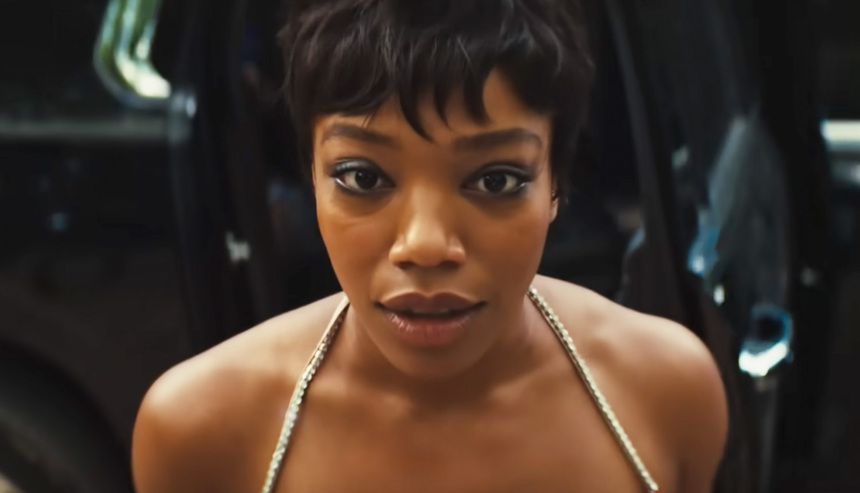Blink Twice is a slick little #MeToo-sploitation thriller as only a nepo baby could make it. As the film’s co-screenwriter, Zoë Kravitz provides an insider’s sense of how the rich and privileged operate. In the director’s chair, she displays an appealing stylistic confidence born of the knowledge that failure won’t mean immediate expulsion from Hollywood. But a strange ambivalence permeates the film that lands Blink Twice in a frustrating ideological mire. It’s as if Kravitz is too jaded to commit to conventional moral outrage but too defensive of her own position to create anything genuinely subversive or provocative.
This ambivalence gives the film spark at first. Both the casual and dedicated misogynist alike might say that catering server Frida (Naomi Ackie) is “asking for it.” She may not know exactly what’s up with tech billionaire Slater King (Channing Tatum), but she knows he’s been accused of sexual misconduct. She doesn’t seem to care. He’s publicly apologized, supposedly reformed his ways, and logged hours of therapy. And he’s a hottie. So Frida goes after what she wants, attempting to get King’s attention by crashing a swanky event she’s supposed to be working. She succeeds in catching his eye. At the end of the night, he invites Frida and her friend Jess (Alia Shawkat) to keep the party going at a more exotic locale. By agreeing to jet off to King’s private isle—the film’s working title was Pussy Island—Frida and Jess plainly put themselves at his mercy. It doesn’t help matters that King requires his guests to surrender their phones upon arrival.

King and his friends drink by the pool all day and stay high all night, which Frida initially finds alluring. The film’s strongest passages are the daytime hangs, when King’s vapid entourage fills the time with asinine conversation. Kravitz satirizes these types of ultra-rich party people with a clear-eyed precision that other aspects of the screenplay lack; she understands that the men who perpetrate the kinds of evil abuses happening on the island by night are nothing more than entitled assholes. Their extravagant crimes don’t make them psychologically fascinating, and Kravitz presents these idiots to us in all of their banal, unself-aware glory. She perfectly captures the profound dullness of these people and their interests and their lives. Kravitz’s work behind the camera in these scenes reinforces this sense of boredom. She authentically conjures the feeling of a vacation day-drinking spree that starts out as decadent fun but gradually fades into a fuzzy monotony. The irony of this presents itself later, when it becomes apparent that Kravitz herself might not have anything interesting to say, despite the film’s intriguing artistic and thematic pretensions.
Frida, who is firmly working class, basks in the honor of finally accessing an inner sanctum of the stupidly wealthy. For a while, she ignores the nagging feeling that something is seriously wrong on the island because she’s ecstatic to be on a luxurious, seemingly never ending, all-expenses-paid holiday. But when the weird shit becomes too weird to set aside, she begins to wonder what’s actually happening when they’re all fucked up on drugs, especially after the sun goes down. Frida starts investigating and uncovers the true, disgusting purpose of King’s private getaway.
Watching Channing Tatum use his bedroom eyes for evil provides the movie’s sickest thrill. Kravitz reportedly sought Tatum for the role from the script’s inception, even prior to their recently-ended romantic entanglement. Even in a uniformly brilliantly cast film, Tatum stands out as a coup. The actor has carefully cultivated a public persona that is, if not explicitly feminist à la Ryan Gosling, derived from a sort of feminine fantasy of masculinity. It’s one hell of a “yes, all men” statement to cast Magic Mike himself as a serial rapist. Tatum plays into his type here—laid back, sexually magnetic, physically commanding, maybe a little dumb but smarter than he appears—to create a monstrous shadow version of the romantic leads he’s known for. King is a tech billionaire, but he’s not the dweeby, incel type who wields his enormous fortune like a cudgel. He knows he can easily get women into bed, Frida included, but it turns out that he still prefers to violently force submission. King is every woman’s deepest fear, embodied by an actor often sold to us as the answer to all of our deepest desires.

Although Frida remains enigmatic throughout the film, she obviously desires power, or at least meaningful proximity to it. She’s tired of being broke, overworked, and ignored. (It should be noted that, while Frida is Black, her race doesn’t explicitly factor into the script. Her resentments seem class-based more than anything else, but class and race often intersect.) She wants to live the good life, seemingly at any cost, and exposing King’s scheme does not change this for her. When Frida finds out that King and his specially invited male guests have been raping the female guests and chemically erasing their memories to get away with it, she is understandably horrified. She finds an antidote to the amnesia-inducing substance with which she and the other women have been dosed, and she restores their memories to gain their help in escaping the island.
Once the other women remember what has been done to them night after night, their rage becomes an unstoppable force. Angriest of all is Sarah (Adria Arjona), Frida’s first ally after Jess goes missing. Sarah might have been the lead if Blink Twice were a more conventional rape revenge film. She wakes up to what’s happening (wham), gets righteously angry about it (bam), and brutally kills her tormentor (thank you, ma’am). Kravitz doesn’t shy away from a cathartic bloodbath in the final act, but it’s a bit of a misdirection. In the end, killing Slater King doesn’t serve Frida, and she knows it. So, as revealed in a final twist that nearly ruins the movie, she opts instead for a gaslight, gatekeep, girlboss kind of revenge.

Rather than murder King, Frida marries him and takes over his company. She achieves this by keeping his ever-present vape pen filled with the memory-erasing compound he formerly used on the women he raped. This power grab is absolutely in line with the behavior Frida has exhibited up to this point in the film, and the mere fact of it doesn’t necessarily feel wrong. The framing of this ending, however, retroactively dilutes the potency of the film’s earlier, more ambiguous positioning of Frida. Kravitz presents this twist as a “good for her” cherry on top, when it should register as something altogether more disturbing and complicated.
It’s uncertain whether Kravitz wasn’t bold enough to follow through with the more offensive implications of the third act or whether she was blind to them. It could be that Kravitz doesn’t understand how the ending isn’t triumphant. It might have been inevitable that the film reflexively asserts that the best revenge is getting to the top of the whole rotten system. Who, after all, benefits from existing power structures more than the nepo baby?



